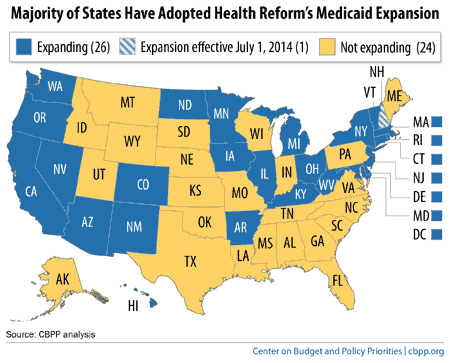BEYOND THE NUMBERS
New Hampshire’s legislature has passed and Governor Maggie Hassan has signed into law legislation that will expand Medicaid as part of health reform effective July 1. This means that combined with Michigan, where expansion takes effect tomorrow, an additional 600,000 uninsured people will be newly eligible for Medicaid coverage. It also means a majority of states have taken health reform’s Medicaid expansion, as our map shows.

For policymakers in Maine, Missouri, Utah, Virginia, and other states currently debating whether to expand, the news from New Hampshire and Michigan offers important lessons:
- Federal officials are willing to work with states to craft reasonable expansion plans. The legislation passed in New Hampshire directs state officials to pursue a demonstration project — often called a “waiver” — that would use Medicaid dollars to buy coverage for newly eligible beneficiaries through the marketplace. If approved, this approach would be similar to those in place in Arkansas and Iowa.
New Hampshire likely will gain federal approval for its demonstration project because it steered clear of onerous provisions being discussed in other states that would make it difficult, if not impossible, for people to gain and maintain coverage. For example, policymakers in Pennsylvania and Missouri have discussed tying people’s Medicaid eligibility and premium obligations to whether they are working or actively looking for work. Such provisions have no relation to the purpose of Medicaid, which is to provide health coverage to people with low incomes.
- States can expand at any time, but the sooner, the better for states and the uninsured. The Medicaid expansion is a great deal for states, but especially so from now through the end of 2016 while the federal government pays the entire cost of covering the newly eligible. (The federal government will pay no less than 90 percent of the cost in the years thereafter.) While New Hampshire’s proposed waiver will not take effect until January 1, 2016, newly eligible beneficiaries will be able to enroll in the state’s existing program on July 1 of this year. This is a win for both the Granite State’s finances and for the uninsured.
